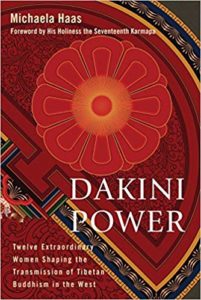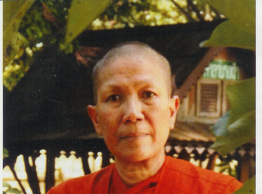 2013 – Comment 12 enseignantes bouddhistes dans la tradition tibétaine ont réussir à fusionner l’Orient et l’Occident – y compris Pema Chodron, Joan Halifax, Thubten Chodron, entre autres.
2013 – Comment 12 enseignantes bouddhistes dans la tradition tibétaine ont réussir à fusionner l’Orient et l’Occident – y compris Pema Chodron, Joan Halifax, Thubten Chodron, entre autres.
Les biographies et les réflexions personnelles de 12 enseignantes bouddhistes dans la tradition tibétaine, Occidentales et Tibétaines, qui partagent les moments d’inspiration où elles ont découvert leur véritable vocation, ont surmonté les obstacles, et développé le courage, la détermination et la sagesse pour progresser sur le chemin spirituel.
Qu’est-ce qui motive une jeune bibliothécaire londonienne à s’embarquer à bord d’un navire pour l’Inde, à méditer dans une grotte isolée pendant douze ans, et ensuite à construire une nonnerie florissante dans l’Himalaya? Comment une surfeuse de Malibu va se retrouver à la tête de la principale organisation internationale pour les femmes bouddhistes ? Pourquoi la fille d’un directeur musical de Santa Monica rêve une nuit de paons d’une façon si saisissante qu’elle poursuit ces images au Népal, où elle trouve l’amour de sa vie dans un jeune maître tibétain non conventionnel ?
L’auteure Micheleine Haas et Lama Tsultrim Allione parlent de « Dakini Power »dans la courte vidéo ci-dessous :
Commentaire Amazon :
While this book is a compilation of 12 profiles of women teachers and authors within Tibetan Buddhism in the West, it is not just for practitioners of Tibetan Buddhism. These 12 women have led fascinating lives by any measurement, and their stories and wisdom will be of interest to anyone interested in female biography, spiritual memoir, Asian culture, or religious history. The author Michaela Haas is a journalist (as well as being a longtime practitioner of Tibetan Buddhism) and does more than tell these women’s stories and ask them polite questions about their faith and teachings. She broaches many subjects in her interviews that will resonate for anyone of any faith: What is the relationship between culture, language, and religion? How much/should a tradition adapt when introduced to a new culture? What does it mean to advance women’s rights within a spiritual context?
Of course if you are interested in Tibetan Buddhism, and particularly if you are yourself a practitioner, this book offers a goldmine of insight. Many key topics are discussed, including the role of lineage, the nature of the teacher/student relationship, rebirth, and how to reconcile Buddhist beliefs with other faiths. The discussions of these topics aren’t pedantic – the women profiled share their personal stories and struggles. They also share the biggest challenges of their lives and their spiritual journeys – struggles getting their families to accept their decisions (especially those who took monastic vows), struggles in their marriages and raising children, struggles with grief, illness, and injury. The Tibetan women profiled share the stories of their escapes (or their families) from Tibet upon the Chinese occupation, and the challenges of resettling in the West. All of them speak of how these life experiences shaped their spiritual path, and how their Buddhist practice shaped their response to them.
As for the women featured, this book is a treasure trove of female Buddhist teachers. Of course there is Pema Chodron, probably the world’s best-selling Buddhist woman author, and several others who are well-known (at least in Buddhist circles) – Tenzin Palmo, Tsultrim Allione, Thubten Chodron, Roshi Joan Halifax (actually a Zen teacher now, but with a Tibetan Buddhist background.) I have read books by and about these women before, but still found many new insights from and about them here. However, I really enjoyed the other profiles – the three Tibetan women included, Jestun Khandro Rinpoche, Dagmola Kusho Sakya, and Khandro Tsering Chodron (profiled movingly posthumously), and other Western-born women who I was not personally as familiar with but who I loved learning from and about – Sangye Khandro, Elizabeth Mattis-Namgyel, Chagdud Khadro, and Karma Lekshe Tsomo. This is truly an amazing group of wise women, and I highly recommend this book!







